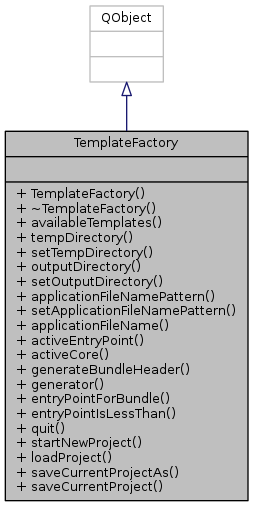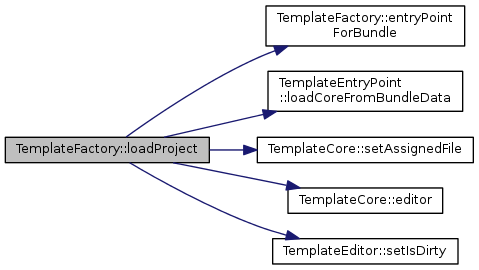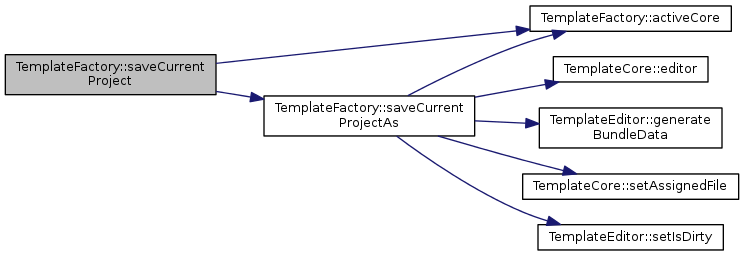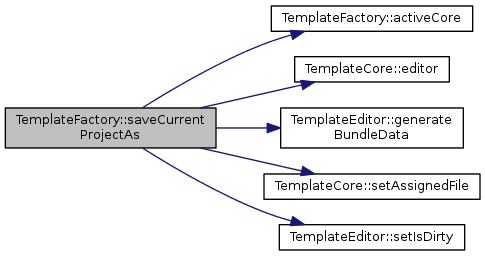 |
BuildmLearn Toolkit
2.0.4
BuildmLearn Toolkit is an easy-to-use program that helps users make mobile apps without any knowledge of application development.
|
 |
BuildmLearn Toolkit
2.0.4
BuildmLearn Toolkit is an easy-to-use program that helps users make mobile apps without any knowledge of application development.
|
The top-level manager of templates. More...
#include <templatefactory.h>

Public Slots | |
| void | quit () |
| Quits running actions of template manager. | |
| bool | startNewProject (TemplateEntryPoint *entry_point) |
| Starts new project core from given entry point. More... | |
| bool | loadProject (const QString &bundle_file_name) |
| Loads stored project and initializes new core according to it. More... | |
| bool | saveCurrentProjectAs (const QString &bundle_file_name) |
| Saves current project to given file. More... | |
| bool | saveCurrentProject () |
| Saves current project to assigned file if there is any. More... | |
Signals | |
| void | newTemplateCoreCreated (TemplateCore *core) |
| Emitted if new project using some template core is started. More... | |
Public Member Functions | |
| TemplateFactory (QObject *parent=0) | |
| QList< TemplateEntryPoint * > | availableTemplates () |
| Access to available templates. More... | |
| QString | tempDirectory () const |
| Access to temporary directory used throughout APK generation process. More... | |
| void | setTempDirectory (const QString &temp_directory) |
| QString | outputDirectory () const |
| Access to directory used throughout APK generation process. More... | |
| void | setOutputDirectory (const QString &output_directory) |
| QString | applicationFileNamePattern () const |
| Access to pattern used for name of output APK file. More... | |
| void | setApplicationFileNamePattern (const QString &file_name_pattern) |
| QString | applicationFileName (const QString &project_name) |
| Generates file name for output APK file. More... | |
| TemplateEntryPoint * | activeEntryPoint () const |
| Access to active entry point. More... | |
| TemplateCore * | activeCore () const |
| Access to active core. More... | |
| QDomDocument | generateBundleHeader (const QString &template_type, const QString &author_name, const QString &author_email, const QString &project_title, const QString &project_description, const QString &template_version) |
| Generates common XML bundle. More... | |
| TemplateGenerator * | generator () const |
| Access to component which supervises generating of APK files. More... | |
| TemplateEntryPoint * | entryPointForBundle (const QString &bundle_data) |
| Decides which entry point raw XML bundle data belong to. More... | |
Static Public Member Functions | |
| static bool | entryPointIsLessThan (TemplateEntryPoint *s1, TemplateEntryPoint &s2) |
| Performs lexicographical comparison of two entry points. More... | |
The top-level manager of templates.
This class is used in a singleton-like fashion from main Application object via Application::templateManager(). It contains all available template entry points.
Definition at line 69 of file templatefactory.h.
|
inline |
Access to active core.
Definition at line 115 of file templatefactory.h.

|
inline |
Access to active entry point.
Definition at line 109 of file templatefactory.h.

| QString TemplateFactory::applicationFileName | ( | const QString & | project_name | ) |
Generates file name for output APK file.
| project_name | Name of source project. |
Definition at line 123 of file templatefactory.cpp.

| QString TemplateFactory::applicationFileNamePattern | ( | ) | const |
Access to pattern used for name of output APK file.
Definition at line 114 of file templatefactory.cpp.

| QList< TemplateEntryPoint * > TemplateFactory::availableTemplates | ( | ) |
Access to available templates.
Definition at line 67 of file templatefactory.cpp.

| TemplateEntryPoint * TemplateFactory::entryPointForBundle | ( | const QString & | bundle_data | ) |
Decides which entry point raw XML bundle data belong to.
| bundle_data | Raw XML bundle data. |
Definition at line 250 of file templatefactory.cpp.

|
static |
Performs lexicographical comparison of two entry points.
| s1 | First entry point. |
| s2 | Second entry point. |
Definition at line 167 of file templatefactory.cpp.

| QDomDocument TemplateFactory::generateBundleHeader | ( | const QString & | template_type, |
| const QString & | author_name, | ||
| const QString & | author_email, | ||
| const QString & | project_title, | ||
| const QString & | project_description, | ||
| const QString & | template_version | ||
| ) |
Generates common XML bundle.
Definition at line 134 of file templatefactory.cpp.
| TemplateGenerator * TemplateFactory::generator | ( | ) | const |
Access to component which supervises generating of APK files.
Definition at line 318 of file templatefactory.cpp.
|
slot |
Loads stored project and initializes new core according to it.
| bundle_file_name | XML bundle file name of saved project. |
Definition at line 197 of file templatefactory.cpp.

|
signal |
Emitted if new project using some template core is started.
| core | Core object pointer. |

| QString TemplateFactory::outputDirectory | ( | ) | const |
Access to directory used throughout APK generation process.
Definition at line 100 of file templatefactory.cpp.
|
slot |
Saves current project to assigned file if there is any.
Definition at line 294 of file templatefactory.cpp.

|
slot |
Saves current project to given file.
| bundle_file_name | File to save project XML bundle to. |
Definition at line 261 of file templatefactory.cpp.


|
slot |
Starts new project core from given entry point.
| entry_point | Entry point to be started. |
Definition at line 185 of file templatefactory.cpp.

| QString TemplateFactory::tempDirectory | ( | ) | const |
Access to temporary directory used throughout APK generation process.
Definition at line 86 of file templatefactory.cpp.